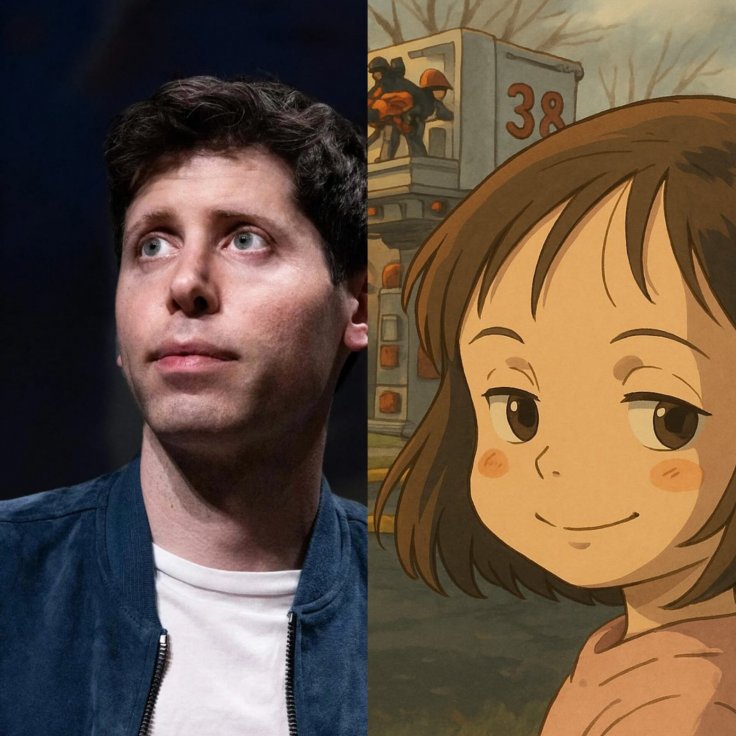A new AI image generator from OpenAI's ChatGPT has taken social media by storm, flooding feeds with stunning Studio Ghibli-style art. Users have been sharing AI-created images featuring iconic Ghibli aesthetics, transforming personal photos, celebrities, and fictional characters into whimsical, hand-drawn visuals. This viral trend has fueled widespread engagement, making the feature one of the most talked-about developments in AI-generated content.

OpenAI Faces Overwhelming Demand
OpenAI launched its native image-generation feature for GPT-4o this week, allowing users to create images solely from text prompts. The tool can generate a wide range of visuals, including infographics, comic strips, and street signs. However, its ability to mimic the distinct Ghibli style has been a major factor in its popularity.
As users rushed to test the feature, OpenAI's CEO, Sam Altman, took to X (formerly Twitter) to comment on the strain it placed on the company's servers. "Can y'all please chill on generating images? This is insane, our team needs sleep," Altman wrote. Despite the overwhelming demand, he assured users that OpenAI would not limit the model's capabilities but asked them to use it responsibly.
xAI's Grok Shuts Down Ghibli-Style Image Generation
While OpenAI's tool has gained traction, Elon Musk's AI company, xAI, has also entered the arena with its chatbot, Grok. Initially, Grok allowed users to create Studio Ghibli-style images, making it a top alternative to ChatGPT's image generator. However, as interest soared, xAI quietly disabled the Ghibli art style generation, sparking backlash from users.
Reports suggest that the feature was removed due to licensing concerns and potential legal challenges related to Studio Ghibli's intellectual property. Some speculate that xAI's decision was also influenced by a strategic shift toward monetization. Despite the removal of the Ghibli feature, Grok remains a popular AI image generator, with many users now forced to explore other alternatives or pay for premium AI services.
The Monetization of AI-Generated Art
As AI-generated art trends explode, major tech firms are finding ways to profit. OpenAI's image generator is currently accessible through ChatGPT, but only for select users. Many have noted that continued access to high-quality image generation may soon come at a cost. Similarly, Grok's removal of the Ghibli-style feature has left users wondering if paywalls will be introduced for similar artistic capabilities in the future.
AI companies benefit greatly from user engagement. Every image request provides valuable data that improves model performance. Additionally, as users flock to these tools, platforms like X and OpenAI's ChatGPT gain traffic, increasing ad revenue and potential subscription sales.
The Privacy Concern: Your Face is the New Currency
While the Ghibli AI trend is captivating, it also raises concerns about privacy. Millions of users are unknowingly feeding their biometric data into AI systems when they upload images for transformation. AI firms store and analyze facial recognition data, mapping unique features for training purposes.
Unlike passwords, facial data cannot be changed once compromised. The facial recognition technology (FRT) industry, valued at $5.01 billion in 2021, is expected to reach $12.67 billion by 2028. Tech giants like Meta and Google have faced scrutiny over their use of user images for AI training, yet transparency remains limited.
Online tools like PimEyes allow individuals to track a person's digital footprint with just a single photo. This opens doors for potential privacy breaches, stalking, and unauthorized data harvesting.
Protecting Your Digital Identity
If you want to safeguard your biometric identity, consider the following precautions:
- Avoid uploading high-resolution photos to AI-powered platforms.
- Disable facial recognition features on social media and smartphones.
- Limit app permissions to prevent unnecessary access to your camera and gallery.
- Advocate for stricter AI regulations to ensure companies disclose how they collect and use biometric data.
OpenAI's Ghibli-style generator has proven how powerful AI tools can be in shaping creative trends. However, with xAI's Grok disabling similar features and concerns over data usage growing, the future of AI-generated art is uncertain.For now, users can still enjoy the magic of AI-generated Ghibli-style images—but they should remain aware of how these tools operate behind the scenes.









